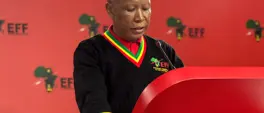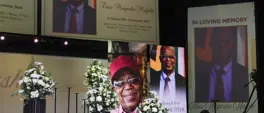MALAIKA MAHLATSI: Malema’s founder’s syndrome will be the death of the EFF
Malaika Mahlatsi
19 August 2024 | 8:54Floyd Shivambu left the EFF for reasons that have nothing to do with uniting them and MK Party, and everything to do with his discontent with leader Julius Malema’s erosion of democratic practices in the EFF, writes Malaika Mahlatsi.
In June 2002, Stephen R. Block and Steven A. Rosenberg published an insightful paper titled “Toward an Understanding of Founder's Syndrome: An Assessment of Power and Privilege Among Founders of Non-Profit Organizations” in the journal Nonprofit Management and Leadership.
The study explores the concept of founder’s syndrome in the context of non-profit organisations (NPOs) and looks specifically at the unique forms of governance and management dynamics that exist in NPOs led by founders in the state of Colorado in the United States.
The authors define founder’s syndrome as “the influential powers and privileges that the founder exercises or that others attribute to the founder”. They go on to state, corroborating existing literature on the concept, that the use of the word “syndrome” suggests unhealthy organisational situations in which founders are more heavy-handed and indifferent about the imbalance of their control over organisations.
While their paper focuses on governance and management in NPOs, other studies have analysed the phenomenon in the context of business and political parties. The results of these studies point to the same thing – that founders of organisations wield significant power which they struggle to let go of.
Furthermore, some of the studies found that many organisations collapse under the weight of powerful founders. This is due in part to the difficulty that boards and executives find in contradicting the strategic direction that founders envision – even when it is calamitous.
The recent events in the Economic Freedom Fighters (EFF) necessitate a critical reflection on the implications of founder’s syndrome for the party.
Last Thursday, the EFF held a press briefing to announce the resignation of its long-serving former deputy president, Floyd Shivambu, who has joined uMkhonto weSizwe (MK) Party.
Shivambu submitted his resignation letter to EFF president Julius Malema, who addressed the media to share the stunning developments. Malema, whose demeanour can only be described as devastated, spoke about the pain that he felt when he received the letter, likening it to that which he felt when he was told the news of his mother’s passing.
He further stated that he had not expected the resignation, emphasising Shivambu was not only his comrade but also his brother.
Shivambu did not provide a reason for his resignation, other than to say that his non-renewal of his EFF membership is not a vote of no confidence in the organisation “but a revolutionary act that will allow Progressive Forces to unite and work towards the agenda for progressive and revolutionary change”.
This part of the statement had many people theorising that Shivambu was effectively being deployed to the MK Party, which is currently the third biggest party in the country, in order to consolidate support for the “radical left”, with the aim of uniting the two parties in the next general election.
I have it on good authority that this is not the case – that Shivambu left for reasons that have nothing to do with uniting the two parties, and everything to do with his discontent with Malema’s erosion of democratic practices in the EFF.
Shivambu is not the first, nor is he the last, to leave the EFF. And while he makes it seem like he’s doing it for revolutionary reasons, those who have left before him have never shied away from asserting their disillusionment with the absolute power that Malema wields in the party.
On the day of Shivambu’s resignation, former EFF KwaZulu Natal leader, Vusi Khoza, who was ejected from the party by Malema, stated in an interview with Newzroom Afrika that there was growing discontent in the party about Malema’s insistence on treating the party like his own personal possession.
This was evidenced in the press briefing, where Malema stated that while the party’s constitution did not allow for members who resigned from the party to return, an exception would be made for Shivambu on account of him being a founding member.
This statement, which on the surface sounds like an expression of brotherhood, illustrates the absolute power that Malema wields.
The EFF constitution is adopted by the highest decision-making body in the organisation, the National People’s Assembly, which comprises branches. The constitution is a product of collective agreement.
But Malema, in his typical fashion of positioning himself above the party and its very constitution, boldly made the assertion he would disregard that very important and foundational document and allow Shivambu to return to the party. This speaks to the absolute power that he wields – power which he has demonstrated many times before.
There is no question that as its co-founder, Malema played an instrumental role in the formation of the EFF. Equally unquestionable is that the party has made a significant contribution to the politics of South Africa.
Despite its declining electoral support, the EFF has certainly rewritten our country’s history and shaped the trajectory of its future. At a time when the old are refusing to die, the EFF has positioned the young as an alternative, reconfiguring our collective imagination that had not, until its formation in 2013, contended with the idea that young people can lead the struggle for economic freedom.
But it is time for Malema to reflect deeply on whether or not his continued stay in the EFF is helpful or detrimental to the organisation. My view is that it is the latter. There is a real danger in Malema’s continued leadership of the EFF.
Firstly, leading a party for over a decade entrenches a culture of presidency for life. This breeds contempt within the organisation, as evidenced in Zimbabwe, where the long-serving Robert Mugabe was removed from office by his own comrades with the help of an army that he had once used to maintain the ZANU-PF’s margin of terror.
Secondly, democracy cannot be entrenched in a climate of fear. Malema has repeatedly made threats about how neither he nor those he supports can lose a political contest. The message this sends out to anyone who even considers contesting him is that not only are they guaranteed to lose, but that there are consequences to daring to even contest him.
This was evidenced in the case of former EFF Gauteng Chairperson, Mandisa Mashego, who resigned four years ago following her failed bid to become the party’s Secretary General. The contest was won by Marshall Dlamini, who had Malema’s support. In such an environment, contestation is difficult.
Thirdly, Malema’s continued stay as president of the EFF denies the party, and the country broadly, of new ideas. There is a generation of younger, radical and brilliant people in the EFF who would be far more appealing to the electorate than a Malema, who has been tainted by problematic pronouncements, alleged involvement in the looting of VBS Mutual Bank and other issues.
These factors have dented the credibility of the EFF, and made many question its capacity for being an effective and morally upright alternative to the battered African National Congress (ANC).
The party needs fresh ideas – and they won’t come from Malema.
Malema needs to accept that there comes a time in the life of an organisation where the founder must make way for others to lead.
If he does not believe the EFF can survive without him, then this would be an indictment on him, as it would be an admission that as a leader, he failed to groom a second layer of leadership.
Furthermore, it would be a confirmation of the widely held view that the EFF is not a revolutionary vehicle, but a personal project of a vindictive man who established it with the sole purpose of settling scores with an ANC that expelled him at the height of his political influence and popularity.
There can be no worse legacy for the EFF than to be reduced to this.
Malaika is a geographer and researcher at the Institute for Pan African Thought and Conversation. She is a PhD in Geography candidate at the University of Bayreuth in Germany.
Get the whole picture 💡
Take a look at the topic timeline for all related articles.
















